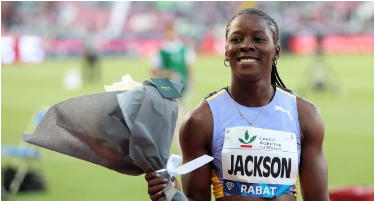Jamaican sprint sensation Shericka Jackson made headlines on Wednesday when she announced her decision to withdraw from the women’s 100 meters at the upcoming Paris Olympics. The decision, which has left fans and commentators alike buzzing with speculation, means Jackson will focus exclusively on the 200 meters, a race in which she has firmly established herself as one of the top competitors in the world.
Jackson, who has been a dominant force in sprinting, particularly in the 200 meters, is a two-time world champion in the event. Her prowess in the 100 meters is also well-documented, having secured silver medals in the event at the last two World Championships and a bronze medal at the Tokyo Olympics.
However, in a brief statement, the 30-year-old athlete made it clear that her focus in Paris will be solely on the 200 meters. “I’m only running the 200m here,” Jackson said, without offering any further explanation for the decision.
While Jackson’s announcement was succinct, the context surrounding her decision suggests that it may be related to a recent injury scare. Just three weeks ago, Jackson was competing in a race in Hungary when she abruptly slowed down in the home straight.
What had begun as a promising run quickly turned concerning as Jackson grimaced in visible discomfort, ultimately slowing to a walk before crossing the finish line. The incident left many questioning whether she had suffered an injury that could impact her performance at the Olympics.
Although Jackson has not publicly detailed the reasons behind her decision to skip the 100 meters, the timing of her withdrawal closely follows this unsettling moment on the track in Hungary. Observers have speculated that Jackson might be exercising caution, choosing to prioritize her health and peak performance in the 200 meters, where she has a stronger chance of success, rather than risking further injury by competing in both sprint events.
Jackson’s absence from the 100 meters at the Paris Olympics undoubtedly shakes up the field. With her out of the running, the race will be wide open, and attention will turn to her fellow Jamaican sprinter, Elaine Thompson-Herah, who won both the 100 and 200 meters at the Tokyo Olympics. Thompson-Herah’s dominance in Tokyo was a historic feat, making her the first woman to defend her Olympic titles in both the 100 and 200 meters since 1988. Now, with Jackson out of the 100 meters, Thompson-Herah’s path to further glory may appear more navigable, though the competition remains fierce.
The women’s 100 meters at the Paris Olympics is set to kick off with the first round on Friday at the iconic Stade de France. The semifinals and finals are scheduled for the following day, promising a thrilling showdown as the world’s fastest women vie for Olympic gold.
Jackson’s decision means that she will be absent from these rounds, instead focusing her energies on the 200 meters, with the first round of that event scheduled for Sunday, followed by the semifinals on Monday, and the final on Tuesday.
 For fans of Jackson, her decision is a bittersweet moment. While there is disappointment in not seeing her compete in the 100 meters, there is also a recognition that she is playing to her strengths and perhaps making a strategic move to safeguard her career and deliver a top performance in the 200 meters. Jackson’s history in the 200 meters speaks for itself, and her focus on this event could very well pay off with another Olympic medal.
For fans of Jackson, her decision is a bittersweet moment. While there is disappointment in not seeing her compete in the 100 meters, there is also a recognition that she is playing to her strengths and perhaps making a strategic move to safeguard her career and deliver a top performance in the 200 meters. Jackson’s history in the 200 meters speaks for itself, and her focus on this event could very well pay off with another Olympic medal.
The Paris Olympics are set to be a defining moment for Jackson, as she seeks to add to her already impressive medal haul. Her decision to concentrate solely on the 200 meters is a reminder of the calculated choices elite athletes often have to make, balancing their aspirations with the realities of their physical condition.
As Jackson steps onto the track in Paris, all eyes will be on her, not just to see if she can defend her world champion status in the 200 meters, but also to witness how this decision shapes her Olympic legacy.
In the broader context of the Games, Jackson’s withdrawal from the 100 meters adds a layer of intrigue and anticipation. It opens up the competition for others while keeping the spotlight firmly on her as she gears up for the 200 meters.
Whether this decision was driven by injury concerns, strategic planning, or a combination of factors, Jackson’s performance in Paris will be closely watched, and her choice may ultimately be vindicated if she clinches another gold medal.
As the countdown to the women’s 100 meters begins, the landscape of the race has undoubtedly shifted, but the excitement and unpredictability of the Olympics remain as high as ever. Jackson’s journey in Paris, with its mix of expectation, mystery, and high stakes, will be one of the most compelling storylines to follow in what promises to be an unforgettable Olympic Games.




